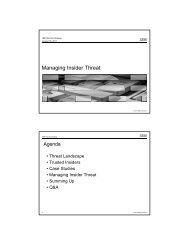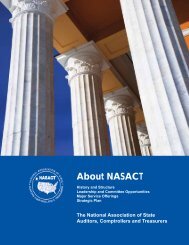Advisory Committee on Tax Exempt and Government Entities (ACT ...
Advisory Committee on Tax Exempt and Government Entities (ACT ...
Advisory Committee on Tax Exempt and Government Entities (ACT ...
Create successful ePaper yourself
Turn your PDF publications into a flip-book with our unique Google optimized e-Paper software.
The Appropriate Role Of The Internal Revenue Service With Respect To <strong>Tax</strong>-<strong>Exempt</strong> Organizati<strong>on</strong> Good Governance Issues(8) The IRS Should Expressly Acknowledge When Governance PracticesAbout Which It Is Inquiring Or Which It Is Addressing Are Not Required.The IRS should expressly acknowledge where practices are not required. In thisregard, we commend the IRS for including in the capti<strong>on</strong> of the Governance,Management <strong>and</strong> Disclosure secti<strong>on</strong> (Part VI) of the redesigned core Form 990the express statement that “Secti<strong>on</strong>s A, B, <strong>and</strong> C request informati<strong>on</strong> aboutpolicies not required by the Internal Revenue Code.” However, there aregovernance questi<strong>on</strong>s <strong>on</strong> other porti<strong>on</strong>s of that Form 990 that did not include asimilar disclaimer. 151 In other IRS governance initiatives the IRS often, but notalways, includes an express statement that recommended policies <strong>and</strong> the likeare not required. 152(9) The IRS Should Expressly Acknowledge that Governance Practices AboutWhich It Is Inquiring Or Which It Is Addressing May Be More AppropriateFor Some Types Of Organizati<strong>on</strong>s Than For Others And Respect The RoleOf The Governing Body In Making Those Decisi<strong>on</strong>s.The tax-exempt sector is hugely diverse in terms of size, sophisticati<strong>on</strong>, locati<strong>on</strong>,resources <strong>and</strong> activities. What may work for <strong>on</strong>e organizati<strong>on</strong>, may not work foranother, or may be outweighed by countervailing c<strong>on</strong>siderati<strong>on</strong>s. The IRSshould acknowledge that it is entirely appropriate for a governing body to choosefrom am<strong>on</strong>g a wide variety of suitable governance practices permitted understate law based <strong>on</strong> the distinctive aspects of the organizati<strong>on</strong>. In someinstances, particularly with small organizati<strong>on</strong>s, that will entail a cost-benefitanalysis. 153 Encouraging an organizati<strong>on</strong>’s governing body to c<strong>on</strong>sider whattypes of governance practices are best for its organizati<strong>on</strong> is in our view typicallythe more appropriate message <strong>and</strong> is supportive of the fundamental <strong>and</strong> whollylegitimate authority of the organizati<strong>on</strong>’s governing board. 154(10)Taking Into Account The Absence Of Certain Governance Practices InDetermining Whether To Audit Or Take Other Compliance Acti<strong>on</strong>s May BeAppropriate in Certain Circumstances. We would c<strong>on</strong>sider it appropriate forthe IRS to make the absence of certain governance procedures a factor thatincreases the likelihood of audit if they are relevant to specific inurement or151See supra note 123.152See supra note 115 regarding the IRS express statements that the c<strong>on</strong>flict of interest policy included with the Form 1023 is notrequired. In c<strong>on</strong>necti<strong>on</strong> with its Governance <strong>and</strong> Related Topics – 501(c)(3) Organizati<strong>on</strong>s, supra note 22, the IRS states in thePreface that “the tax law generally does not m<strong>and</strong>ate particular management structures, operati<strong>on</strong>al policies, or administrativepractices. . . .” This statement is not, in our view, explicit enough to obviate the need to state with respect to each recommendedpractice that it is not required. The IRS specifies that certain practices are not required, such as governance <strong>and</strong> managementpolicies, but not with respect to other matters such as board size, board independence, board compositi<strong>on</strong>, fundraising costs, audits,<strong>and</strong> transparency with respect to fundraising expenses, c<strong>on</strong>flict of interest policy, <strong>and</strong> financial statements.153See, for example, supra notes 136-38 <strong>and</strong> accompanying text.154For example, see GuideStar’s comments about the draft redesigned Form 990, supra note 121. The Governance <strong>and</strong> RelatedTopics – 501(c)(3) Organizati<strong>on</strong>s, supra note 22, states: “Depending <strong>on</strong> an organizati<strong>on</strong>’s specific situati<strong>on</strong>, some of therecommended policies <strong>and</strong> practices will be more appropriate than others.” Id. at Preface. In c<strong>on</strong>necti<strong>on</strong> with the recommendati<strong>on</strong>that organizati<strong>on</strong>s adopt a c<strong>on</strong>flict of interest policy, the IRS does suggest that the governing board tailor the policy to theorganizati<strong>on</strong>’s needs. See supra note 151.ADVISORY COMMITTEE ON TAX EXEMPT AND GOVERNMENT ENTITIES (<strong>ACT</strong>) June 11, 2008 54













